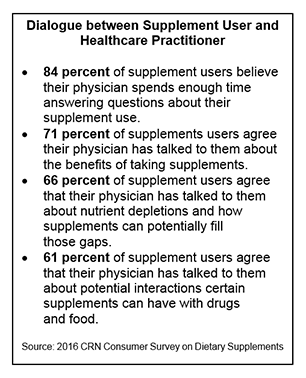Washington, D.C., September 26, 2017—More than nine in ten supplement users (91 percent) let their physicians know about the supplements they are taking, according to the Council for Responsible Nutrition’s (CRN) 2016 Consumer Survey on Dietary Supplements. Data from this annual survey reflect the current consumer atmosphere of the dietary supplement industry and provide key insights to the usage, purchasing habits, and confidence of adult dietary supplement users in the United States.
“The number one goal of the dietary supplement industry is consumer safety,” said Duffy MacKay, N.D., senior vice president, scientific & regulatory affairs, CRN. “We are pleased to see that as more and more Americans incorporate dietary supplements into their health and wellness regimens, they are disclosing their use of these products to their healthcare practitioners in an effort to use supplements safely and responsibly. An open dialogue between a patient and a healthcare practitioner—whether a doctor, registered dietitian, or pharmacist—is crucial for achieving good health, and, according to CRN’s survey, dietary supplement users recognize that.”
Historically, healthcare practitioners have served as the most trusted source for reliable information on dietary supplements. In 2016, medical doctors/physicians were the top sources supplement users trusted for reliable information on dietary supplements (56 percent), followed by nutritionists (42 percent), pharmacists (40 percent), physician assistants (28 percent), nurse practitioners (28 percent), and registered dietitians (27 percent).
According to Dr. MacKay, consumers  can best inform healthcare practitioners of their supplement usage by:
can best inform healthcare practitioners of their supplement usage by:
- Bringing a list of the supplements being used—or even the supplement bottles themselves—to appointments.
- Asking questions about potential interactions or nutrient depletions with medications. People who take certain medications can be blocking absorption or depleting certain nutrients from their body.
- If you aren’t taking supplements? Keep a food diary and discuss your eating habits with your healthcare practitioner to determine whether dietary supplements may be helpful. Also, talk with your doctor about whether you’d benefit from a blood test to detect possible nutrient shortfalls.
“Don’t be afraid to ask questions,” advised Dr. MacKay. “There isn’t a one-size-fits-all approach to wellness—everyone is different.”
Continued Dr. MacKay, “As consumers take a more holistic approach to healthcare, we will likely see an increase in supplement usage. However, the onus to have the conversation about dietary supplement use should not be solely on the consumer. Healthcare practitioners have a responsibility, too, and we encourage them to have an open mind about the evolving consumer and the increased interest in integrative health.”
The survey was conducted Aug. 24–30, 2016 by Ipsos Public Affairs and was funded by CRN. The survey was conducted online in English and included a national sample of 2,007 adults aged 18 and older living in the United States, including 1,430 among those who are considered supplement users. The survey has been conducted annually since 2000. The precision of Ipsos online polls are measured using a credibility interval. In this case, the poll has a credibility interval of plus or minus 2.5 percentage points for all respondents, and plus or minus 3.0 percentage points for supplement users (see Ipsos’ online polling methodology for more info). Data from the 2017 survey will be released later this year.
Note to Editor: The Council for Responsible Nutrition (CRN), founded in 1973, is a Washington, D.C.-based trade association representing 150+ dietary supplement and functional food manufacturers, ingredient suppliers, and companies providing services to those manufacturers and suppliers. In addition to complying with a host of federal and state regulations governing dietary supplements and food in the areas of manufacturing, marketing, quality control and safety, our manufacturer and supplier members also agree to adhere to additional voluntary guidelines as well as to CRN’s Code of Ethics. Visit www.crnusa.org. Follow us on Twitter @CRN_Supplements and LinkedIn.

